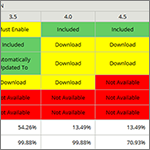I've updated my .NET Availability & Viability With Portable Apps article with last month's stats from Net Applications. It discusses and anlyzes whether using .NET-based applications is a viable solution in a portable scenario (running apps from a USB drive, cloud drive, etc). While the news is good for overall compatibility and for spread of the later versions of the framework, it's fit as a solution in the overall portable environment continues to decline. This is primarily due to Microsoft's decision to disable .NET 2.0 through 3.5 apps on Windows 8, 8.1, and 8.1 update 1. For example, using a .NET 2.0 portable app like on Windows 8 requires an admin to manually enable .NET 2.0 support; something that won't happen on a PC that's not your own. So, even if you base your app on the now-outdated .NET 2.0 framework, it will run on Windows Vista and Windows 7 out of the box, but it will fail on Windows 8 and later unless an admin enables it. And, as Windows 8 and later continue to increase in market share (13.49% and growing), this will be an even larger issue. In short, .NET is a bad solution for portable software unless all the PCs you will be coming in contact with are either under your control (where you can install or enable .NET yourself via admin rights) or known quantities (you know ahead of time what .NET frameworks are installed or enabled on every PC).
UPDATE May 10, 2014 - It seems I missed out on the fact that apps can be set to have multiple later supportedRuntime versions listed. So, KeePass 2.0, for example, includes 4.0 and 4.5 as supported runtimes in its .config file, even though it's a .NET 2.0 app. By doing so, KeePass 2.0 will run on Windows 8/8.1 out of the box without issue. While this doesn't change the overall issues with .NET support entirely, it does open the door to us including specific .NET apps that work with a wide range of .NET framework versions in the Portable App Directory. We're discussing it over in this PortableApps.com forum post.
